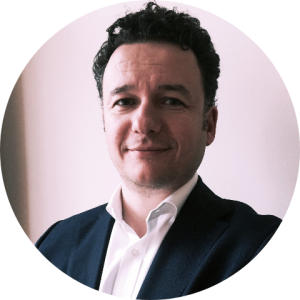- Published date:
- 16 June 2020
Member Spotlight Interview: Groundsure
 In our latest Members Spotlight Interview, we spoke with Dan Montagnani, EVP at Groundsure. The leading UK environmental search authority giving professionals, businesses and homebuyers expert information on risks including land contamination, flooding and ground stability.
Dan has been in the environmental risk arena for 26 years. He has been responsible for leading the Groundsure business, focused on optimising the delivery of data intelligence solutions into the UK property market. Dan is a Fellow of the Royal Geographical Society and a Trustee of the South Downs National Park.
Dan shares insights into their recent acquisition of Mining Searches UK, how Groundsure provides customers confidence in property and land decisions and how their technology is evolving.
In our latest Members Spotlight Interview, we spoke with Dan Montagnani, EVP at Groundsure. The leading UK environmental search authority giving professionals, businesses and homebuyers expert information on risks including land contamination, flooding and ground stability.
Dan has been in the environmental risk arena for 26 years. He has been responsible for leading the Groundsure business, focused on optimising the delivery of data intelligence solutions into the UK property market. Dan is a Fellow of the Royal Geographical Society and a Trustee of the South Downs National Park.
Dan shares insights into their recent acquisition of Mining Searches UK, how Groundsure provides customers confidence in property and land decisions and how their technology is evolving.
Q: Groundsure has grown to be a market leading environmental search company in the UK, what is the story behind Groundsure? A: We started life as an enthusiastic start up - well intentioned but lots to learn. With some good trading under our belts we were acquired by our current group company in 2007. Then came the recession of 2008 and for us that brought huge challenges as a business intimately linked to UK property transactions. The challenge of the recession caused us to refocus our business and that in turn enabled us to come out of that period very strongly with strong market share growth. Over the last five years, we have been working hard to bring product and service differentiation to a market that in many respects is commoditised. Our business goals in that time have also broadened and expanded. Today many probably look at Groundsure as something of an establishment business, part of a large corporate. Whilst in many ways that might be true, we have retained our entrepreneurial spirit and challenge mindset. Q: How does Groundsure give customers confidence in property and land decisions and can you share the technology behind this? A: We address headline property risks with products that give simple, clear answers with a high degree of certainty and assurance. Our products incorporate extensive geospatial datasets using a range of algorithms and expert interpretation. We present data and risks to customers in plain and simple terms that are easy to digest. Two key factors here are: 1) Taking the complex and making it simple - customers have confidence in the knowledge that our products make a full and complete assessment of all of the available data; 2) Ensuring that where we define problems, i.e. risks that might impact on the completion of a property transaction, that we offer customers options around solving those issues, ordinarily through engagement with our expert consultants. Approached in the right way, those risks can often be turned into some form of commercial advantage. We use a range of technologies across our data science, technology, product and research teams and we partner with third parties to develop new and innovative products and solutions. Q: Groundsure recently announced they have acquired Mining Searches UK, can you give us insight into what this acquisition involves and aims to achieve? A: Groundsure and Mining Searches UK had been collaborating very effectively for around 18 months and so this was the logical next step. The two businesses together are better placed to achieve the common goal of being the leading supplier of property search products in the UK. Later this year we will be bringing to market a major product launch which will be the direct result of the collaboration amongst our teams. The integration has been helped enormously by the fact that both businesses shared similar values, principles and culture. It was an easy fit and is working really well. Q: How do you see technology evolving at Groundsure? A: Without giving away any secrets, we are constantly evaluating and working on developing our technologies. Some of that is not necessarily visible to customers - what they see might simply be better products or a better delivery of service. Collaborating with others is also an interesting area where we increasingly see opportunities to add really useful high-value services into our market segments where we have reasonably significant market reach. Across our customer segments, how customers wish to consume our products in the future is without a doubt changing. As a business that is both “corporate” and “start-up” it’s important that we make those orderly transitions in the right way. Timing and phasing are just as important as the endpoint in terms of ensuring we optimise our commercial position through that transition and take customers on the journey with us. Q: Lastly, where do you see the industry headed in 2-5 years? A: The conveyancing space is interesting in terms of technological change taking place against a backdrop of increasing process, checks and security. To an extent they exert opposite forces on timescales for cases to progress. Over the long term of course we expect a faster and more automated process with these additional things all happening seamlessly and instantly. Whilst it feels like the last five years has seen significant technology progress in conveyancing, the recent COVID-19 lockdown situation has shown us that the reality is that the end to end process has some way to go. This is probably less about searches and more to do with accepted working protocols across lenders, estate agents, conveyancers and indeed homebuyers themselves. A good degree of mindset change is still required! At the height of lockdown we saw transaction volumes fall to 35-40% of normal. These were likely to comprise a blend of residual cases progressing slowly with remote working practices and investment decisions where property viewings were not taking place. The market is some way from being digital. Five years from now there will be a more connected and digital-first process as standard (not as the exception) where consumers have a much higher expectation level in terms of visibility of the property, the conveyancing process, completion times and the overall buying experience. Technology and mindset shift will deliver this but it has to apply to the end to end process otherwise we are only as fast as the slowest moving part.
Share article
